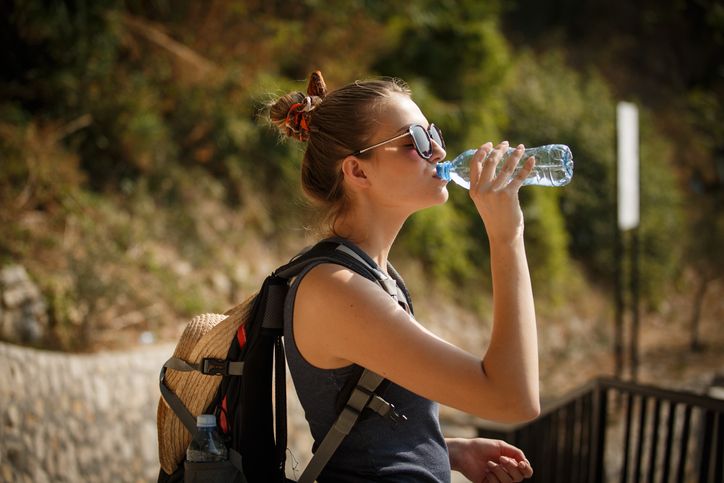Emergency and Trauma Care
Want to learn more about this at Kettering Health?
The truth is most Americans are dehydrated.
Nearly 75% drink at most 2.5 cups of water, the equivalent of one bottled water, a day.
And while multiple factors shape how much water a person needs to stay hydrated, suffice it to say: 2.5 cups aren’t enough.
“A person’s water intake depends on climate, level of activity, and even medical conditions,” says Ryan Konkel, EMS Coordinator for Kettering Health. “But the National Academy of Science, Engineering and Medicine does recommend an average daily water intake of about 125 ounces (roughly 15 cups, or just less than a gallon) for men and about 91 ounces for women.”
And as we gather for outdoor summer fun, sporting events, and concerts, our daily dehydration dilemma can escalate into something more dire—even life-threatening.
Staying hydrated is difficult. But it’s important not to wait to drink water at the first sign of dehydration.
Don’t wait till you’re thirsty
The first thing to keep in mind is “If you feel thirsty, you are already dehydrated,” says Anna Ludwick, paramedic and event manager for Kettering Health EMS.
Thirst is the body’s signal that more water has left the body than has gone in. But we often disregard feeling thirsty, or, if we quench our thirst, we do so with coffee and soda, which, in excess amounts can worsen dehydration.
“Make a plan to drink water throughout the day,” Ryan says. “This can also include drinking water before, after, and during any activity. Also plan to limit drinks that can worsen dehydration, such as energy drinks, soft drinks, and alcohol.”
Chronic dehydration can lead to a range of health problems and symptoms, such as headaches, cramps, skin problems, fatigue, and even body fat retention.
And as dehydration worsens, it thickens our blood, which may put stress on the heart, leading to a rapid heart rate. And, with less water in the blood to move oxygen, you may start to breathe faster as the body compensates for a lack of oxygen to vital organs.
Before you head out for any physical activity, especially if you’re going to where it’s hot, know how to stay safe and hydrated. And for those who are pregnant, older, or have diabetes, talk to your doctor about what you might need beforehand.
“Make sure to discuss with your physician if you need to take extra caution. This could be due to medications, medical conditions, or increased activity—especially in the heat.”
How to respond to dehydration
If you or someone around you shows signs or has symptoms of dehydration, such as a headache or light-headedness, it’s important to act quickly before things get worse.
“Some dramatic signs and symptoms of severe dehydration include increased heart rate, lethargy, or loss of consciousness,” says Ryan.
Respond quickly with the following:
- Encourage fluids: Water and sports drinks are good options. If the person is nauseous, sipping on small amounts of water or an electrolyte solution can help.
- Rest: It’s important for the person to rest and avoid any activities that could further dehydrate them. Help them find a place where they can stay off their feet.
- Cool down: If the person is sweating excessively, move them to a cool, shaded area and use a fan or cool compress to help lower their body temperature.
- Monitor symptoms: Keep an eye on the person’s symptoms and encourage them to drink fluids until they start to improve.
“If someone has collapsed or fainted from dehydration,” Ryan says, “try to cool the person (if heat related) and call 911.”
Remember: you’re mostly water
Of all the reasons staying hydrated can be difficult, Ryan points out that “we tend to underestimate how much water our bodies need. It could be that we forget our bodies are mostly water.”
From our skin to our cells, water makes up much of our bodies—roughly 60%. More specifically, the lungs are 83% water; the heart, 79% water; the brain, nearly 75% water; the muscles, 75%; bones, roughly 31%; and even human hair is 25% water.
Not only are we mostly water, but our bodies use it for everything. It’s a lubricant in our throats, GI tracts, and joints. It’s a coolant for our body temperature. And it’s a solvent, helping move oxygen and nutrients throughout the body.
In short, our bodies use and lose water all day, every day. Stay safe this summer: stay hydrated.









